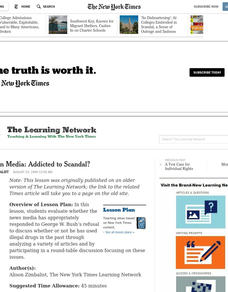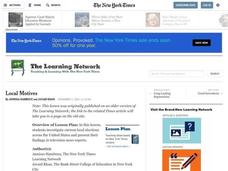Curated OER
Friar Margil and the Spanish Missions
Students examine the concepts of diversity and assimilation. They identify the validity of sources and recognize bias, and create original illustrations from the students' point of view which show the impact of the Spanish friars on the...
Curated OER
American Media: Addicted to Scandal?
Students examine media coverage of George W. Bush's refusal to answer questions regarding past illegal drug usage in the 1999 campaign. They consider the role of rumor, scandal, audience and relevance in political media coverage.
Curated OER
Japan's Textbook Case
Students read and discuss "Japan's Refusal to Revise Textbooks Angers Neighbors." They discuss how accurately textbooks account for historical events, then collaborate to write unbiased textbook entries for current events.
Curated OER
Neighborhood or Slum? Snapshots of Five Points: 1827-1867
How has your local neighborhood changed throughout recent history? Young researchers evaluate census data, images, and primary source descriptions describing the living situation in the antebellum Five Points neighborhood. They consider...
Curated OER
Local Motives
Investigate current local elections across the United States with this New York Times reading lesson. Using informational text, middle and high schoolers research local elections and create their own news reports about what they...
Curated OER
Charles Darwin Meets John Paul II
If you teach AP English language and composition and are looking for a way to address the differences between written and spoken arguments, consider this instructional activity. Over the course of three days, class members research...
National Center for Case Study Teaching in Science
Cell Phone Use and Cancer
The cell phone you're using is making you deaf: news at 11:00. Oftentimes, the media uses fear tactics and other techniques to increase its audience base. In an intriguing look at the difference between scientific journals and...
Curated OER
A Snapshot in Time
Students state the main ideas of the article. They create questions to clarify the meaning of the article and to help explain the ideas. Students cite words or phrases that reveal a bias the author may have.
Curated OER
Determining Point of View
Students examine web sites to determine point of view and bias in information sources. They determine the usefulness of information based on these biases or limitations.
Curated OER
Newspaper Writing on Flight in History
Students read about important events in history through newspaper articles. For this newspaper lesson, students look at different writing styles and author's bias in different articles about the same event. They write their own articles...
Curated OER
Propaganda
How does word choice affect the reading of a text? Compare two headlines that were written about the same event. Is one biased? Discuss how word choice often reveals the author's feelings about a topic. Then look at different techniques...
Media Education Lab
Propaganda in Context
"Board Game Helps Fight Real World Ebola," a video produced by Voice of America, provides the text for a guided instructional activity that asks viewers to analyze the propaganda techniques used in the video. Groups then select a example...
Walters Art Museum
The Symbolism of Allegorical Art
Introduce learners to allegorical art with four bronze sculptures by Francesco Bertos. After modeling how to recognize bias and allegory in Bertos' Africa, class groups examine the other three sculptures in the series before creating...
Curated OER
Dating Behaviors and Refusal Skills
Saying no to sex means an individual has the power to decide when he/she is ready to engage in the act, on his/her own terms. Pupils discuss waiting until they are married to have sex, what sexual values are, and how to say no to sexual...
Curated OER
Interactive Duty
Students consider the role of multimedia news features. They analyze the New York Times coverage of the president's State of the Union address.
Curated OER
Reflections and Revisions
Students reflect upon and express affective and cognitive learning experience as a result of a direct service experience. In this service learning lesson plan, students examine and analyze symbolism portrayed in literature and its...
Museum of Tolerance
Developing Media Literacy
To protect young people from questionable content, many schools limit access. This resource suggests that because learners can so readily avail themselves to unrestricted Internet access, it is vital for 21st century learners to develop...
Center for History Education
Women's Rights in the American Century
Today, many young people find it hard to understand why it took over 150 years for women in the United States to get the right to vote—why there was even a need for the suffrage movement. As they read a series of primary source...
Curated OER
Using Primary Source Documents in the Classroom
Students use primary documents to explore the past. They consider the source of the documents and identify and biases that the author may have held. They identify any questions about the historical event that may remain after reading the...
Curated OER
Investigation-Design Your Own Spinner
Young scholars design their own spinner that meets the given criteria. In this math lesson, students discuss biased versus unbiased events or outcomes when dealing with probability. Young scholars are given 5 criteria that must be...
Curated OER
Laurence Yep's Dragonwings
Students read independently the novel, "Dragonwings," by Laurence Yep and make connections between a text and the world. They summarize, paraphrase, analyze and evaluate skimming and scanning techniques when reading a novel. Each student...
Curated OER
The President's Day Has Arrived
Young scholars state and defend their opinions regarding all aspects of the impeachment proceedings against President Clinton after completing a survey and researching the topic. They also consider opinion polls, media bias and global...
Curated OER
How Has African American Culture Shaped the History of Kentucky?
Eleventh graders explore the African American culture and history of Kentucky. They observe how an author's personal bias can define the argument of his/her publication. Students analyze primary source documents.
Teaching Tolerance
Using Photographs to Teach Social Justice | Exposing Racism
Photographs capture a moment in time. And some of the best pictures demand that viewers not only ask questions about why the photo packs such an emotional wallop, but also about what happened before and after it was taken. A photograph...
Other popular searches
- Author's Bias Worksheet
- Author's Bias & Propaganda
- Authors Bias and Opinion
- Author's Bias in Literature
- Author's Bias Pocahontas
- Author's Bias 6th Grade
- Author's Bias 5th Grade
- Author's Bias 3rd Grade
- Author's Bias in Reading
- Authors Bias & Propaganda
- Identifying Author's Bias
- Identifying Authors Bias

























